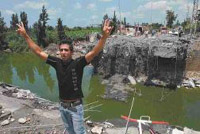Israel holds talks with Hezbollah and HAMAS for release of its captured soldiers
Israel and radical Islamic groups Hezbollah and HAMAS may cut a deal to release Israeli POWs and Arabic prisoners within two or three weeks, reports Egyptian weekly Al-Ahram. According to the newspaper, the Lebanese and Palestinian prisoners would be set free by Israel in exchange for the release of the Israeli soldiers Ehud Goldwasser and Eldad Refeva, captured by Hezbollah militants on the border with Israel on July 12th, and the corporal Gilad Shilat, captured on the border with the Gaza Strip on June 25th. Germany is reported to be mediating an exchange of prisoners.

Al-Ahram provides no details as to the names of the Lebanese and Palestinian prisoners to be released if the deal is agreed upon. Information obtained by Vremya Novostei indicates that the list of names in question pertains to a group of 15 Lebabese men held in Israeli prisons at the moment. The list is most likely to include the well-known Samir Kuntar. The above is currently serving a life sentence for his participation in a terrorist attack that took place in the Israeli city of Nahariya in April 1979. Kuntar’s name on the list seems to explain the reason why Hezbollah demanded that such a small number of its militants be released in exchange for the captured Israeli servicemen. In 2004, Israel freed 436 Arabic prisoners in exchange for the release of the Israeli busisnessman Elhanan Tennenbaum, and the return of mortal remains of three Israeli servicemen. Germany also mediated the deal two years ago. By the way, Israeli Foreign Minister Tsivi Livni arrived in Berlin on Monday for talks.
“ Israel will have to release some high-ranking prisoners including Samir Kuntar. At the moment the move seems to be almost imminent,” said Lt. Col. (Ret.) Moshe Marzuk, former head of the Lebanese desk for Israeli Military Intelligence who is now a researcher at the Institute for Counter-Terrorism in Herzliya, in an interview to Vremya Novostei. If the exchange of the captured Israeli soldiers for the Arabic prisoner goes under way, Israel is likely to actively continue negotiations to secure a release of Israeli army corporal Gilad Salit who is kept by his captors somewhere in the Gaza Strip. Gilad Shalit turned 20 on Monday. He has already spent 2 months and 2 days in captivity.
According to Al-Ahram, the Palestinians demanded that Israel free 12 members belonging to various Palestinian militant groups for the release of Shalit. The list includes Marvan Barguti and Ahmad Saadat who are currently serving life sentences in Israel for masterminding terrorist attacks.
Meanwhile, the international community is making an effort to normalize the situation in the region. The EU expects to deploy a 4,000-strong peacekeeping force in southern Lebanon bythe end of this week. In total, the EU plans to send 7,000 troops in addition to a 2,000-strong contingent of the UN Interim Force in Lebanon (UNIFIL). Major General Alain Pellegrini is in command of the UNIFIL. France is to send two battalions (800 strong each). About 400 French soldiers have been already deployed in Lebanon . Half of the above French military are field engineers.
The French will be in charge of the UN peacekeeping force in Lebanon until February 2007. Then the Italians will take over command. The vanguard of 3,000 Italian peacekeepers is due to arrive in Lebanon on Tuesday. Spain should send a force of 1,200 peacekeepers; Poland should send 500 soldiers, Belgium has committed 400 troops, and Finland should allocate 250 troops. Portugal, Latvia and Lithuania also promised to commit their troops to the peacekeeping mission in Lebanon . The above counties have not yet revealed more details as to the number of troops to be allocated for peacekeeping purposes.
As for Germany , it is especially concerned about possible clashes between German peacekeepers and Israeli forces on the ground, and therefore Germany is ready to provide any kind of military aid but ground forces for the combined peacekeeping effort in Lebanon . Britain , Greece , and Sweden share Germany ’s viewpoint. Turkish President Ahmet Necdet Sezer suddenly spoke against the participation of Turkey ’s peacekeeping force in the UNIFIL. The UN had previously expected that Turkey would commit 5,000 troops to the mission in Lebanon . “We could give it a thought after the UN Security Council resolution becomes clear,” Sezer was quoted as saying by news agencies.
The UN Secretary General Kofi Annan arrived in Lebanon on Monday. He already said that the UNIFIL would not disarm Hezbollah militants. “A political consensus among the Lebanese on the issue should be reached prior to going ahead with the process of disarmament,” said Annan.
Russian Defense Minister Sergei Ivanov said that no decision with regard to the allocation of Russian troops for the UN peacekeeping mission in southern Lebanon had been made so far. The Israelis view the possibility of the deployment of Russian peacekeepers in Lebanon rather apprehensively. “The deployment of Russian soldiers in Lebanon is a serious move that requires thorough consideration on the part of the Israeli government,” said Moshe Marzuk, in his interview to Vremya Novostei. “The point is that Russia is interested in making economic deals with the Arabic countries. The deals mostly concern the sale of arms, and Russia doesn’t seem to be greatly concerned about the fact that Russian-made arms sometimes get into someone’s dirty hands,” said Marzuk.
Vremya Novostei
Translated by Guerman Grachev
Subscribe to Pravda.Ru Telegram channel, Facebook, RSS!

